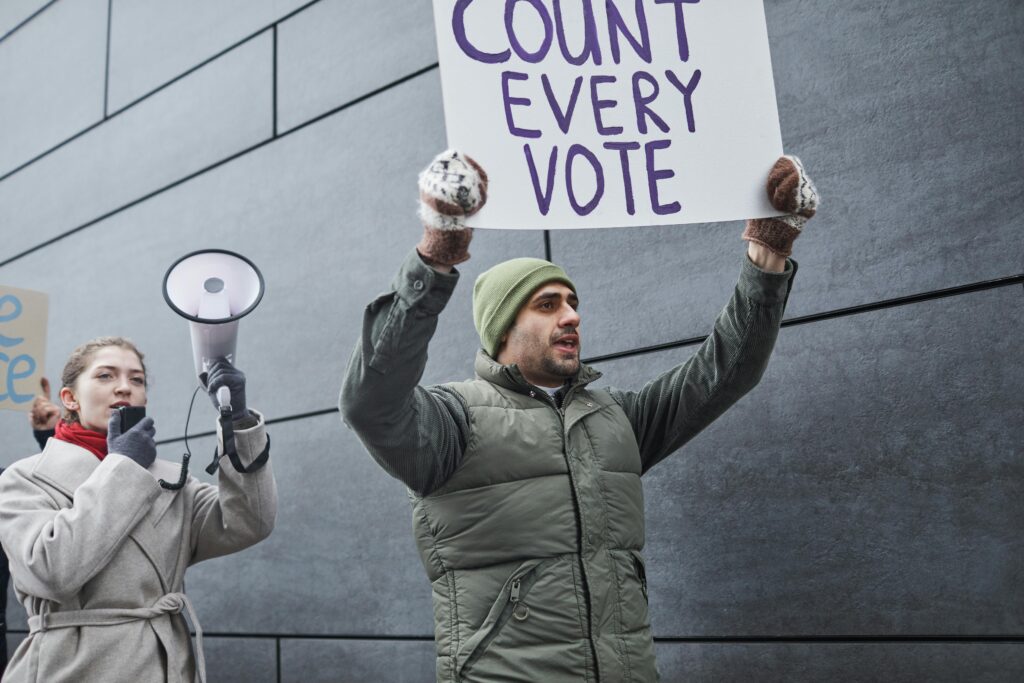Social media deluge of misinformation over US vote fraud raises elections and chaos concerns.

US Election Flooded with Voter Fraud Claims on Social Media, Sparking Fears of Distrust and Unrest
In the context of the United States hosting its next presidential elections in the year 2024, a wave of baseless allegations that voter fraud is taking place in all corners is dominating much of what is being shared online. Electoral politics at all levels are thus being brought to a boil as many election officials from various parts of the United States caution that some pieces of advice may threaten people’s acceptance of elections at one point or another. Much of it echoes former President Donald Trump’s repeated assertions that the 2020 election was stolen from him-with a narrative suggesting he might again lose because of fraudulent activity.

Election officials and fact-checkers now are at heightened alertness, working against the disinformation that proliferates across these platforms, including Truth Social, X-also known formerly as Twitter-and fringe message boards. Hundreds of so-called “voting irregularities” have been posted, including many shared by independent conservative groups and accounts affiliated with the Republican party. In far fewer numbers, even some of those are shared by Democrats. Still, virtually all the misinformation amplifies claims from Trump that he faces being “cheated” out of winning once more in 2024.
Earlier this year, Trump said he would accept the result of the election only if it was a “fair and legal and good election.” His words have left many Americans worried about his potential reaction if he loses. According to a recent CNN/SSRS poll, 70% of Americans expect Trump to reject the result if he is defeated, raising fears of renewed post-election unrest like that seen in 2020.
Fraud Claims Grow in Key Swing States
This week, Trump posted on his social media platform Truth Social that Pennsylvania, one of the crucial swing states, was perpetrating massive election fraud. “Pennsylvania is cheating, and getting caught, at large scale levels rarely seen before,” he wrote. He asked his followers to report the supposed fraud to the authorities, adding, “Law Enforcement must act, NOW!”
This was after the three Pennsylvania counties’ officials said they were working with the local law enforcement agencies to investigate certain voter registration applications. The Republican Pennsylvania Secretary of State, Al Schmidt, responded rapidly to Trump’s claims by stating that caution was warranted as such investigations are routine and form part of the built-in checks and balances aimed at maintaining voter registration integrity. This is an indication that the in-built checks of our voter registration process are working, he said.
Misinformation Spreads Online and Across Borders
With misinformation already rampant months before election day, election officials face an increasingly daunting task to counter false narratives. According to a recent report by the BBC, hundreds of false or misleading claims of election fraud have been circulating on social media, reaching millions of users. Videos, images, and posts have been widely shared and often based on claims that are entirely fabricated or misleading. For example, a video went viral claiming to show recently-arrived Haitian immigrants voting in Georgia. US security officials discovered it was a fake video using stock footage and posted by foreign actors, including Russian influence networks.
A post on X that purportedly came from a Canadian boasted a photo of a ballot with the caption “Figured I would drive across the border and vote.” Of course, it was a fake, with the ballot shown belonging to Florida – a state which requires a photo identification to vote in person, and about 20 hours away from the Canadian border. The post traced back to a coordinated disinformation campaign organized on the notorious message board 4chan.
There is a Northampton County, Pennsylvania video going viral with a fellow dropping a container of ballots at a courthouse with statements claiming this is fraud. In reality, he was a mailman delivering mail-in ballots to their intended destination yet the video had been watched more than five million times before the explanation of what the video depicted was clarified.
Reflections of the 2020 Election
Experts say the volume and intensity of false information are much higher in 2024 than they were in 2020, which raises fears of rampant distrust in election results. In the aftermath of the 2020 election, Trump and his supporters relied on the same methods of denying the results. This gave way to widespread protests, this time under the “Stop the Steal” banner, culminating in the Capitol riot on January 6, 2021. Dozens of court cases brought by the team of Trump across different states added to the fire: not a single case changed the outcome, but it made permanent skepticism within Trump’s ranks.
The founder of the Global Project Against Hate and Extremism, Wendy Via, explained that “right-wing and far-right activists are better prepared for the election to be stolen” than they were in 2020. She further added that the conspiracy theory of election fraud has spread even more profoundly into those groups, and some activists are resolute to take action if they feel that Trump has lost unfairly.
Election Day Safety Becoming an Increasing Concern
This raises the possible concern on election day for violence and intimidation, as rhetoric concerning voter fraud continues to escalate. In battleground states like Wisconsin, supporters of the Trump campaign have already voiced out a feeling of distrust in the process, stating that only “illegal activity” could win Trump a defeat. Brad Miller, a supporter, said that he is confident Trump will win, unless there’s “no cheating.” His comments reflect a feeling that many within Trump’s base carry: an assumption that the process, if fair, will deliver their preferred outcome, and any other result would be evidence of foul play.
Election Officials Urge Caution and Vigilance
At a time when the election rhetoric has heightened, state officials around the country are warning citizens to be on guard regarding receiving information from social media sites about their elections. In Pennsylvania, Secretary of State Al Schmidt alerted the voters to watch out for the “half-truths” and “disinformation” circulating through online means, but indicated that these features are sophisticated enough to sort through the legitimate fraud.
Meanwhile, state and local election officials are bracing for what promises to be a potentially chaotic election day, during which misinformation may sow confusion or mistrust. Social media is being closely watched by election security experts, who say they are ready to pounce on disinformation campaigns as they develop. Still, the scale of the problem remains overwhelming: Disinformation threatens not only to erode faith in the electoral system but also to incite unrest.
This creates a situation where, on election day, the whole nation operates in an online space that is filled with allegations of voter fraud and conspiracy theories. In this regard, this wave of misinformation is shaping public perception, which may potentially have important significant consequences for the stability of the democratic process in 2024 and beyond.




